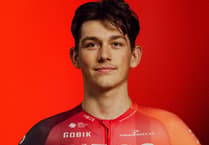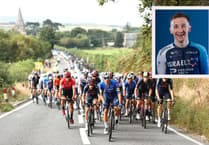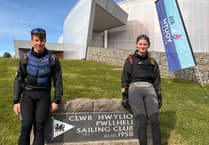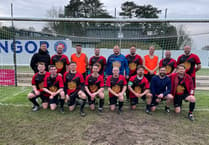A 71-year-old man from Penuwch, Ceredigion, represented Wales in the National Lifesaving Championship, and came home with a total of six medals for his efforts in the competition, writes Alex Bowen.
Stuart Yeandle has been an avid lifesaver since he was an early teen, when he first started competing in lifesaving competitions. The passion he developed then is one that has stayed with him throughout his life, and his over 50 years of competing in the sport.
“I started lifesaving in the 1960s when I was about 13 or 14. I did my first lifeguard competition not long after. I progressed into national competitions and I’ve been competing for over 50 years.”
He was one of six people from across the country to represent Wales in the National Lifesaving Championship held in Yorkshire on 4 November. 16 countries participated including Wales, England, Scotland and Ireland.
In order to represent Wales, Stuart and his team first needed to win in the regional championships, battling against other people in their age category who were also fighting for a spot on the Wales team.
Competitors are divided into categories based on their ages, and need to show their abilities in four different life saving situations, including unknown aquatic incident, unknown CPR incident, rope throw rescue, and a swim and tow rescue.
Stuart took part in the over 70s category, and came first in three out of the four life saving situations, and second in the last. His overall score earned him another gold medal, and the combined score of the Wales team earned him, and its other members, another gold medal.
Outside of lifesaving competitions, Stuart has needed his lifesaving skills ‘many times.’ His knowledge has saved people’s lives in the past, and kept him physically and mentally fit.
Reflecting on his lifetime of competing in the sport, he said: “It’s wonderful, it’s good for your physical and mental health, and it’s not like swimming where it’s based on who can do it the fastest.
“You’ve got to bring a lot of disciplines together to be good at it. It gives you skills that you can put into use when they come into situations where someone has collapsed, or suffered injuries or they’re in water and need help. It gives them skills, and gives the community people who can act in these situations.
“I’ve had to use these skills many times. I’ve been involved in all sorts of rescues, whether it was people in the sea or in the pool. There’s one that I remember well, I was on holiday with my family and this little girl was drowning in the pool. I pulled her out and put her in the recovery position and luckily the water started coming out of her. A lot of people wanted to help but didn’t know what to do.”





Comments
This article has no comments yet. Be the first to leave a comment.